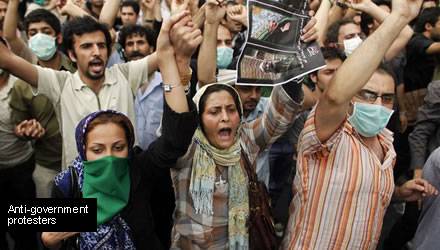Iran: Divided Theocratic Regime Paralysed By Sanctions
 international |
anti-war / imperialism |
other press
international |
anti-war / imperialism |
other press  Thursday July 22, 2010 13:15
Thursday July 22, 2010 13:15 by John Cornford
by John Cornford
Yassamine Mather writes on how the US is stepping up Sanctions against Iran in its attempts to impose Regime Change From Above and on the paraalysing effect thgis is having on the Regime. She also comments on problems among the opposition forces. Full text at url.
New sanctions imposed by the United States government last week were the most significant hostile moves against Iran’s Islamic Republic since 1979. They marked a period of unprecedented coordination led by the US to obtain the support of the United Nations and European Union.
After months of denying their significance, the government of president Mahmoud Ahmadinejad was forced to react by setting up an emergency counter-sanctions unit, whilst Iranian aviation officials accused the UK, Germany and the United Arab Emirates of refusing to supply fuel for civilian Iranian airplanes. As it turned out, this was not true. However, the EU banned most of Iran Air’s jets from flying over its territory, because of safety concerns directly related to previous sanctions. It is said that most of the national airline’s fleet, including Boeing 727s and 747s and its Airbus A320s, are unsafe because the company has not been able to replace faulty components.
Superficial analysts abroad labelled last year’s anti-dictatorship protesters in Iran as middle class. However, those present at these demonstrations were adamant that workers, students and the unemployed played a huge role. In May, the Centre to Defend Families of the Slain and Detained in Iran published the names of 10 workers who were killed in post-election street protests, and there is considerable evidence that workers, the unemployed and shanty town-dwellers were among the forces that radicalised the movement’s slogans (crossing the red lines imposed by green leaders, such as the call for an end to the entire regime, and for the complete separation of state and religion). In addition we are witnessing an increasing number of workers’ demonstrations, sit-ins and strikes against the non-payment of wages, deteriorating conditions and low pay. The workers’ protest movement has been dubbed a tsunami, and in recent months it has adopted clear political slogans against the dictatorship.
Last week was typical. Five hundred workers staged protests outside Abadan refinery against unpaid wages, blocking the road outside the refinery. Two of their comrades filming the action were arrested, but these workers are adamant they will continue the strikes and demonstrations next week. Three hundred Pars metal workers staged a separate protest against non-payment of wages and cuts in many of the workers’ benefits, such as the bus to and from work and the subsidised canteen, which managers of the privatised company intend to close. Similar protests have taken place in dozens of large and small firms throughout Iran. Most have moved on from purely economic demands to include political slogans against the regime.
